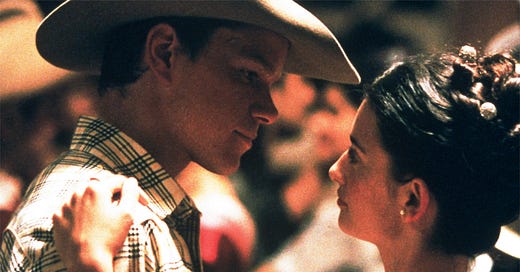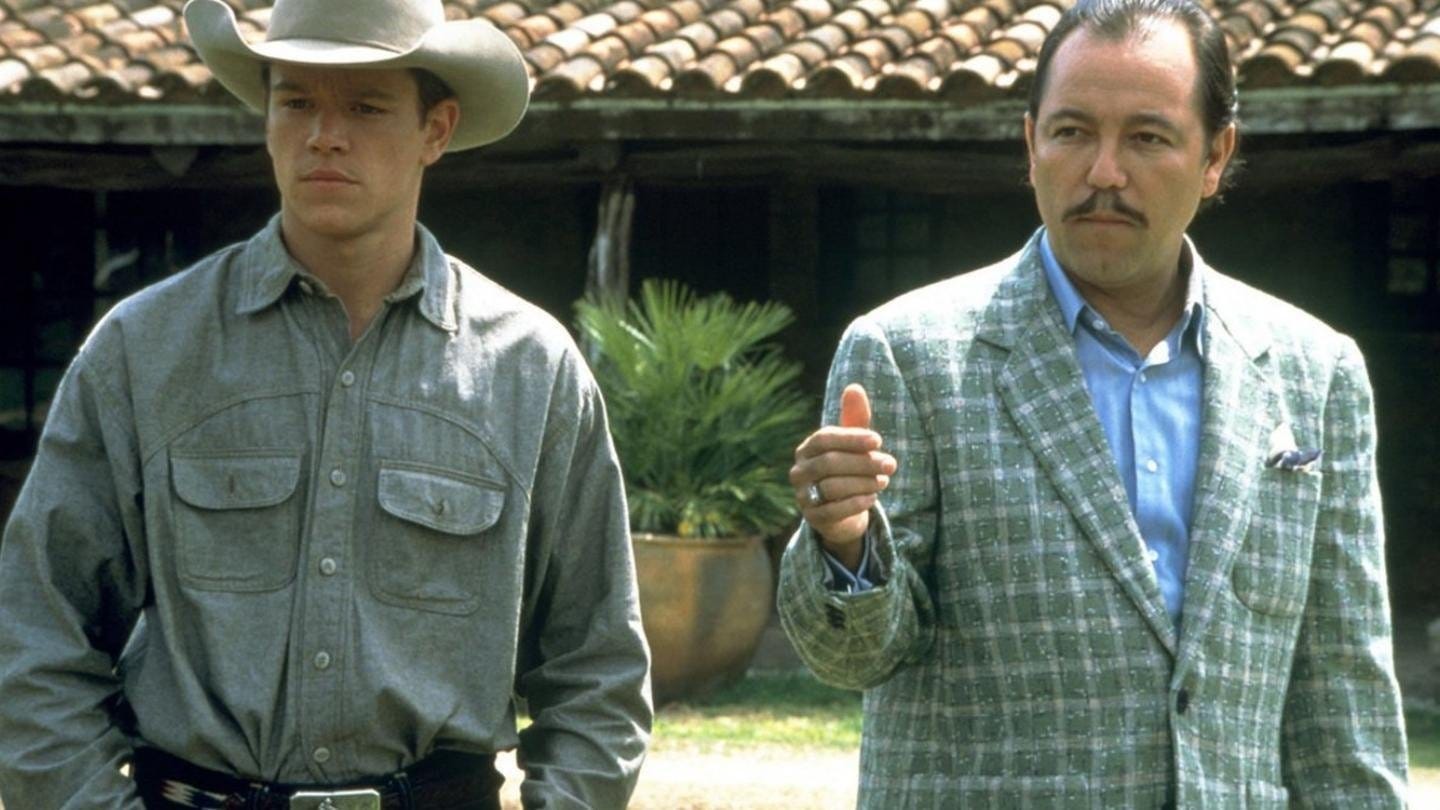All the Pretty Horses (2000)
For 25 years, I've wanted to see a movie that Harvey Weinstein destroyed. Here are my original notes on the wreckage of Billy Bob Thornton's Cormac McCarthy adaptation, and dismaying footnote.
This review was first published at Looking Closer website in December 2000—years before I learned the painful details of how Harvey Weinstein hacked the life out of it, left us this severely abridged version, and robbed us of an original score by Daniel Lanois. (See the footnote I’ve added to this review.) It’s been 25 years, and I still dream of seeing Billy Bob Thornton’s full vision realized. But I also suspect that Cormac McCarthy’s enthralling novel is just not suited to a full filmic adaptation. Maybe somebody will someday prove me wrong.
Maybe it’s time to give this project to someone who can give it a full series adaptation, or a two-part feature. Maybe it’s time for somebody to do whatever it takes to bring Thornton’s vision to audiences at last.
What a shame.
All the Pretty Horses, director Billy Bob Thornton’s adaptation of the great Cormac McCarthy novel, must have been a marvelous film.
But this is not that film.
This feature-length montage of scenes from Thornton’s as-yet-unreleased movie suggests that he had distilled McCarthy’s complex epic into a compelling, panoramic epic fraught with challenging ethical dilemmas and soul-searching conversations. It appears that cinematographer Barry Markowitz, who lensed Robert Duvall’s masterpiece The Apostle, meant to draw us into environments as immersive and poetic as those in Terrence Malick’s films. The performances, what we see of them, especially those of Matt Damon as John Grady Cole and Henry Thomas as Lacey Rawlins, are engaging, tough, and just convincing enough. And the score, what we hear of it, is enchanting—particularly when Daniel Lanois is casting spells with his atmospheric guitar wizardry.
But everything else is a problem. Everything that happened after the last day of shooting, that is.
When Thornton put together his final cut of All the Pretty Horses, the movie apparently ran longer than three hours. And rightly so. The novel is a strong, sweeping epic, something more suited to a miniseries than a matinee. But what we get here is barely two hours long, thanks to cuts demanded by studio execs. You can feel editors rushing to pack in key scenes into the first two acts so that Acts Three and Four have some resonance. What we have is a big-screen equivalent of the novel’s Cliff’s Notes.1
The opening act is a choppy ride across the border into Mexico. John Grady Cole (Damon) and his pal Rawlins (Thomas) are headed out to find ranch work, when they are joined by a suspicious youngster named Blevins (Lucas Black, who starred in Thornton’s Sling Blade.) Blevins is a tough-talking kid on the run from something, who knows what. He also claims to be a human lightning rod. Grady is patient with the youngster, but Rawlins is worried. Before long, Rawlins’ worries will prove to be frighteningly well-founded, and Cole will find that his kindness has led the two of into deep trouble.
During this chapter, the score by Marty Stuart seemed to me all wrong... a bombastic, stereotypically American anthem, announcing that something quite exciting was going on, when it wasn’t. The occasional flourishes from the original Lanois work seems so much more fitting to the tone of the story: tentative, spooky, spiritual. I suspect that the studio inflicted the Stuart score on Thornton’s project, banking on something more commercial and traditional, disregarding the director’s artistic intuitions. Thornton had worked with Lanois just fine on Sling Blade; I can’t imagine why he’d toss away such evocative work.
Grady, as the story goes, gets a good job on a ranch and falls for the ranch owner's daughter Alejandra (Penelope Cruz), just in time for old ghosts to come back and haunt him. The romance at the heart of the film happens so rapidly, with so little development of dialogue or relationship between Grady and Alejandra, we don't understand his compulsion, his willingness to risk all that is important to him in order to be her man.
Later, when he’s unjustly abused in a Mexican penitentiary, it’s hard not to feel for him—we’d feel empathy for any characters suffering such things. Damon's performance here is especially strong as we watch the reality of his situation settling in, and as he slowly accepts its brutal reality. But the prison chapter ends so abruptly, moviegoers in the theater might wonder if the projectionist loaded the wrong reel of film.
Only the grand finale, a violent adventure, plays out in a way that seems like it might be intact—because, of course, this is what studio execs probably assume an audience most wants to see. But that is followed by a fleeting courtroom scenario that seems implausible due to its brevity.
The end credits claim that the movie stars Matt Damon, Penelope Cruz, Henry Thomas, Ruben Blades, Bruce Dern, and more. I saw Damon and Thomas, and there were brief appearances by Cruz. Blades showed his face a few times, but rarely spoke. And Dern... well, he gets a few choice moments at the end, and that’s all.
This may be the first—and I hope it’s the last—film I’ve fully reviewed without having seen it. What I have seen is what you will see if you buy a ticket or eventually rent it: broken pieces that promise a wonderful whole. Miramax’s All the Pretty Horses taunts us with glimmers of the greatness of Thornton’s film. It tells us Miramax thinks the audience wants, not what the filmmakers themselves wanted us to see. Watching this is like being told you’ll have a scenic tour of the country on horseback, and then you’re strapped to a bucking bronco. I walked away saddle-sore.
My frustrations with the film were, I would eventually learn, a reaction to gross misconduct on the part of studio head Harvey Weinstein. In recent years, we’ve learned a lot about Weinstein’s tendency to exploit and abuse others in the industry—most egregiously in his habit of sexually abusing, assaulting, and even raping actresses.
In 2004, in Peter Biskind’s Down and Dirty Pictures: Miramax, Sundance, and the Rise of Independent Film, we learned much more about how All the Pretty Horses—and director Billy Bob Thornton himself—suffered at the hands of Harvey Weinstein and Miramax. On page 422, Biskind quotes Matt Damon: “We were all unhappy with it. … It was like you bake a souffle and somebody wants you to make it half the size, and you just chop the thing in half and try to mold it and make it look like that was how you made it to begin with. It can't work.”
Damon continues: “[Weinstein] tried to make it look like a love story, so that teenagers would go see it. He made a trailer with me and Penelope Cruz swimming around in the water, skinny-dipping, with Bono singing, and Billy's going, ‘Look, I love U2, but it's just not appropriate.’ And on the poster, they put, ‘Some passions can never be tamed,’ which is exactly what the movie's not about. There is no love story, it's about unrequited love, it’s about life being bigger than these people and just crushing the passion out of them. At the end, it was R-rated, so teenagers couldn't go anyway.”
Regarding Thornton’s directorial gifts: “He doesn’t want to direct anymore,” says Damon. “He said, ‘It almost killed me.’ He lost all this weight, went into the hospital with a heart problem, he was so stressed he couldn’t sleep.”







